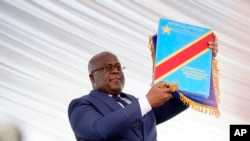Felix Tshisekedi, president of the DR Congo, is in full control of a new government unveiled Monday after a four-month power struggle with predecessor Joseph Kabila, an official announcement indicated.
The president had in February named the head of state-owned mining giant Gecamines, Jean-Michel Sama Lukonde Kyenge, as prime minister.
Sama Lukonde succeeded Sylvestre Ilunga Ilunkamba, who was forced out after a coalition between supporters of Tshisekedi and Kabila broke down.
The new government dubbed the "Sacred Union of the Nation" counts 57 members including 14 women, according to a presidential decree read out over state broadcaster RTNC by the presidential spokesman, Kasongo Mwema.
Sama Lukonde said the new team's priorities would include security, infrastructure and electoral reform in the poor but resource-rich country.
"The size of the government has been reduced, women's and young people's participation has been taken into account. Principles of representation and inclusivity have been upheld," he added.
But the challenges are huge for the government of sub-Saharan Africa's largest country by area, with repeated massacres of civilians in the restive East, intractable corruption and tax income dwarfed by massive expenditures -- currently shored up by the country's partners.
While members of Tshisekedi's inner circle have been given the defense, interior, finance and education portfolios, figures from the anti-Kabila opposition have been named to key posts, including environment minister and deputy prime minister Eve Bazaiba of the Movement for the Liberation of the Congo (MLC).
The new foreign minister is Christophe Lutundula, close to Moise Katumbi, a former governor of Katanga province who himself attempted to challenge Kabila in a 2018 election.
DR Congo's leadership crisis arose from elections in December that year that led to the first peaceful transition of power in the former Belgian colony's history.
Tshisekedi, the son of a veteran opposition leader, was declared the winner but was forced into a governing coalition with Kabila supporters who at the time wielded a huge majority in parliament.
Tensions boiled over last year when Tshisekedi declared that power-sharing was blocking his agenda for reform, vowing to seek a new majority in parliament.
In a series of moves, he won over many Kabila legislators, gaining the perceived support of almost 400 out of 500 members of the National Assembly.
The new majority enabled him to force out Ilunga as well as the pro-Kabila speakers of both houses of parliament.
With backing from both the US and European Union, Tshisekedi, 57, has a free hand to work on his priorities of slashing corruption and the poverty that affects two-thirds of Congolese, as well as pacifying the more than 100 armed militias plaguing the country's east.
